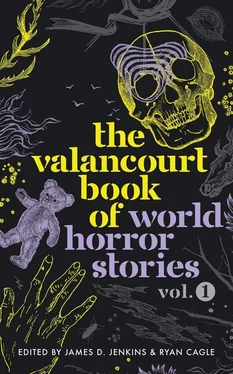Julia had to make an effort not to cut in. These things happened to her too and she had never considered them the least bit important. Since she was little she had been able to control some of her dreams, to know suddenly in the middle of the worst nightmare that she, and only she, was in absolute control of this magical series of images and that just by deciding to, she could get rid of certain characters, summon others, or speed up the pace of what was happening. It wasn’t always successful – for that she had to be conscious of ownership over the dream – and, what’s more, she didn’t find it especially fun. She preferred to let herself get involved in the strange stories as if they were really happening and she were simply the protagonist, but not the owner, of those unpredictable adventures. One time her sister Marta, despite her young age, told her something similar. ‘Today in my dream I was in charge,’ she had said. And now she suddenly remembered certain conversations on the subject with her classmates and she even thought she had read something similar in the memoirs of a baroness or countess that a friend had lent her. She lit the rumpled cigarette she was still holding in her hand, inhaled a mouthful of smoke and felt something rough and hot that burned her throat. When she heard her own cough, she realized that the most absolute silence reigned in the room and that it must have already been a while since Carlos had stopped speaking and she had given herself up to stupid fantasies.
‘Go on, please,’ she said finally.
Carlos, after hesitating, proceeded:
‘It was the house, the house where we are now, you and I, the house where we’ve spent all our summers since we were born. And yet there was something very strange about it. Something tremendously disagreeable and distressing that at first I couldn’t put my finger on. Because it was exactly this house, except that by a strange gift or punishment I could see it from an unusual visual angle. I awoke sweating and shaken and tried to calm myself by remembering that it had only been a dream.’
Carlos covered his face with his hands and stifled a groan. His sister thought he mumbled an unnecessary ‘until coming here’ and she relived, with a sense of disappointment, the transformation she had witnessed days earlier at the garden gate. ‘So that’s what it was,’ she was going to say, ‘just that.’ But she didn’t say a word this time either. Carlos had gotten to his feet.
‘It’s an angle,’ he continued. ‘A strange angle which, for all the horror it evokes in me, is nonetheless real . . . And the worst part is there’s no escape. I know that for the rest of my life I’ll never be able to free myself from it.’
The final sobs made her look away towards the rooftop. Suddenly it made her uncomfortable to be there, not understanding much of what she was hearing, feeling definitely alarmed in the face of the breakdown of someone she had always believed to be so strong, healthy, and enviable. Maybe her parents were right and Carlos’s problems couldn’t be solved by kindness or by listening to his secrets. He needed a doctor. And her job was going to involve something as simple as getting out of that suffocating bedroom as soon as possible and joining in the rest of the family’s worry. ‘Well,’ she said decisively, ‘I had promised to bring Marta to the movies . . .’ But then she noticed that her facial expression belied her feigned calmness. In Carlos’s sunglasses she saw her own face reflected twice. Two heads with disheveled hair and very frightened, wide-open eyes. That must be how he was seeing her: a girl caught in an ogre’s den, inventing excuses to quietly leave the room, awaiting the moment she could cross the threshold, take a deep breath, and take off running downstairs. And now, moreover, Carlos, from the other side of the dark lenses, seemed to have become spellbound scrutinizing her, and she felt below those two heads with disheveled hair and frightened eyes two pairs of legs that were beginning to tremble too much for her to be able to go on talking about Marta or the movies, as if this were just an ordinary afternoon when Marta or the vague promise of taking her to the movies mattered. The shadow cast by a windblown sheet deprived her of the sight of her brother for a few moments. When the light returned again, Julia noticed that Carlos had approached even closer. He held the glasses in one hand; his eyelids were swollen and he had a delirious expression. ‘It’s amazing,’ he said in a faint voice. ‘You, Julia, I can still look at you.’ And again that preference, that uniqueness that he accorded her for the second time that afternoon put an end to her intentions with an unbelievable speed. ‘He’s in love,’ she said during dinner, and without appetite she ate a plate of tasteless vegetables that she forgot to salt and season.
It was not long before she realized she had acted stupidly. That night and those that followed the first visit to the attic. When she set herself up as go-between between her brother and the world, when she took charge of making his untouched plates disappear from his bedroom; when, like the loyal ally she had always been, she revealed to Carlos the doctor’s diagnosis – acute depression – and the family’s decision to hospitalize him in a rest home. But now it was too late to go back. Carlos received the news of his imminent hospitalization with a surprisingly relaxed attitude. He put on his sunglasses – those impenetrable glasses he only dared to remove in her presence – declared his desire to leave the attic, walked arm in arm with Julia through some of the rooms of the house, greeted the family, answered their questions with reassuring phrases. Yes, he was fine, much better, the worst was past now, there was no need for them to worry. He locked himself for several minutes in his parents’ bathroom. Julia, through the door, heard the click-clack of the metal cabinet, the crackling of paper, the dripping of eau de cologne. When he emerged, she found him neat and well-groomed, and he seemed much more tranquil and serene. She accompanied him to his bedroom, helped him get into bed and went down to the dining room.
It was somewhat later when Julia suddenly felt frightened. She remembered the attic door’s lock, torn off by her father several days ago, her mother’s concern, the doctor’s meaningful gesture as he declared himself powerless against the pains of the soul, the click-clack of the metal cabinet . . . A white, tidy cabinet in which it had never occurred to her to nose around, the medicine chest, her mother’s pride, no one else could gather such a quantity of medicines for any situation in such a small space. She ascended the stairs two at a time, panting like a greyhound, terrified at the possibility of giving a name to what was unnameable. Arriving at the bedroom, she pushed open the door, opened the shutters and rushed to the bed. Carlos was sleeping peacefully, without his inseparable sunglasses, unmindful of anxieties and torments. Neither the torrents of sun from the rooftop filtering in through the window, nor Julia’s efforts to wake him, got him to move a muscle. She surprised herself by wailing, yelling, leaning over the staircase and calling the names of the family. Afterwards everything happened unbelievably quickly. Carlos’s breathing was becoming weak, almost imperceptible, his face recovered at moments the quiet and tranquil beauty of other times, his mouth sketched a beatific and peaceful half-smile. The evidence could now no longer be denied: Carlos was sleeping for the first time since he returned from Brighton, that second of September, the date she had colored red on her calendar.
She didn’t have time to regret her stupid behavior, nor to wish with all her strength that time could turn backwards, that it could still be August and she would be sitting on the rooftop eaves beside a pile of notebooks awaiting the arrival of her brother. But she closed her eyes and tried to convince herself that she was still little, a girl who during the day played with dolls and collected stickers and who, sometimes, at night, suffered terrible nightmares. ‘I am the master of the dream,’ she told herself. ‘It’s only a dream.’ But when she opened her eyes she didn’t feel capable of going on with the deception. That terrible nightmare wasn’t a dream, nor did she possess any power to rewind images, alter situations, or even make that handsome and peaceful face regain the anguish of illness. Again the shadow of a windblown sheet took possession of the room for some moments. Julia turned her gaze again toward her brother. For the first time in her life she understood what death was. Inexplicable, incomprehensible, hidden behind an appearance of feigned rest. She saw Death, its horror and destruction, its putrefaction and abyss. Because it was no longer Carlos who was lying in the bed, but Death, the great thief, crudely disguised in another’s features, roaring with laughter between those red, swollen eyelids, revealing to all the deception of life, proclaiming her dark kingdom, her capricious will, her cruel and unshakeable designs. Julia rubbed her eyes and looked at her father. It was her father. That man seated at the head of the bed was her father. But there was something immensely disagreeable in his features. As if a skull had been made up with globs of wax, powdered and colored with theater makeup. A clown, she thought, a clown of the worst type . . . She grabbed her mother’s arm, and a sudden repulsion forced her to move away. Why was her skin suddenly so pale, so slimy to the touch? She ran out to the rooftop and leaned on the balustrade.
Читать дальше











